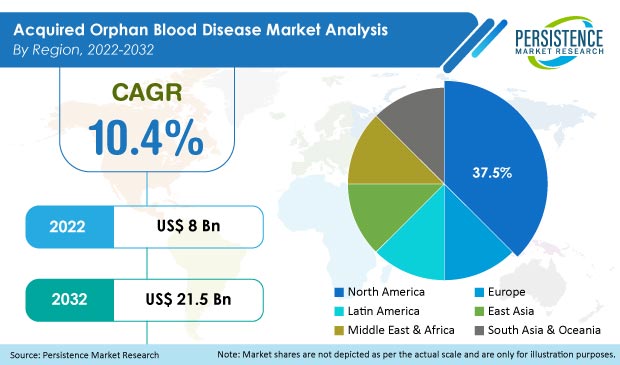Acquired Orphan Blood Disease Market Segmented By Recombinant Factor, Immunoglobulin Infusion Therapy, Activated Prothrombin Complex Concentrate, Thrombopoietin Receptor Agonists Therapy with Acquired Agranulocytosis, Acquired Hemophilia, Acquired Von Willebrand Syndrome, Myelodysplastic Syndrome Disease Indication
Industry: Healthcare
Published Date: October-2022
Format: PPT*, PDF, EXCEL
Delivery Timelines: Contact Sales
Number of Pages: 250
Report ID: PMRREP4464
The global acquired orphan blood disease market is estimated to expand at a CAGR of 10.4% and reach a valuation of US$ 21.5 Bn by 2032, up from US$ 8 Bn in 2022. North America is expected to remain the leading regional market through the forecast period of 2022 to 2032.
|
Acquired Orphan Blood Disease Market Size (2022E) |
US$ 8 Bn |
|
Projected Sales of Acquired Orphan Blood Disease (2032F) |
US$ 21.5 Bn |
|
Global Market Growth Rate (2022-2032) |
10.4% CAGR |
|
Market Share of North America (2021A) |
37.5% |
“Rising Incidence of Chronic Diseases across the World”
The increasing incidences related to chronic diseases around the world are likely to propel the demand for effective healthcare solutions and thus drive sales opportunities in the acquired orphan blood disease market. In addition, people are becoming more aware related to healthcare in recent years which is predicted to stimulate demand impetuses in the global market. Improved technological advancements in the medical industry are also driving growth avenues in the market.
“Increasing Per Capita Income in Developing Nations”
At present, the per capita income of people living in developing countries is increasing at a noticeable speed that further bolsters their capacity to spend more on advanced healthcare solutions. The factor is likely to increase sales avenues in the global acquired orphan blood disease market.
The emergence of novel therapies is expected to open up new avenues for industry players. Moreover, in many emerging markets, for instance, India is also anticipated to create various new growth opportunities in the market while contributing to the demand avenues.
“Longer Duration for Approval of Drugs to Limit Opportunities”
A long time duration is required in order to receive approval for drugs from the acquired blood disease market. It becomes a very tiring process for industry players that is likely to take more effort and time and thus predicted to restrict growth opportunities in the market.
In addition, stringent regulatory policies are projected to restrain expansion opportunities in the market in the years ahead. Fewer investments by industry players in these rare diseases are also estimated to pose challenges for growth impetuses in the market. Moreover, the rising count of consolidations is likely to restrain the entry of novel players across the market.

“Increasing Prevalence of Blood-Related Diseases in North America”
North America is anticipated to hold a dominating position in the market owing to the rising count of blood-related diseases in the region. In addition, increased R&D investment in novel drugs and growing access to healthcare insurance facilities, especially in the U.S. are estimated to influence growth opportunities in the regional market.
After North America, Europe is also expected to grow at a noticeable speed in the years ahead due to the presence of well-structured and advanced healthcare solutions. East Asia and South Asia & Pacific regions are projected to grow at a rapid pace owing to increasing government initiatives for effective healthcare facilities and rising healthcare infrastructure. The presence of a larger patient population in the regions is expected to drive demand opportunities in the regional markets.
Blood disorders are caused due to lack of blood components. These components include red blood cells, white blood cells, and platelets. Anemia, leucopenia, and thrombocytopenia are some of the common blood disorders. Some of the common symptoms of blood diseases include fatigue, headache, weakness, fever, infections, and bleeding.
Acquired orphan blood disease is a type of rare blood disorder, which occurs due to the presence of an insufficient amount of red blood cells in the blood. This disease is characterized by the body’s inability to produce red blood cells. Moreover, improper functioning of bone marrow also leads to a lack of red blood cells in the blood, which in turn results in a decrease in platelet numbers.
This decrease in platelet number causes anemia and thrombosis. Anemia is a blood condition characterized by less number of red blood cells. Loss of blood is the commonest cause of anemia and it further results in chronic outcomes. Thrombosis refers to the formation of a blood clot in blood vessels.
Some of the common types of orphan blood disease, which lead to acquired orphan blood diseases, include Paroxysmal Nocturnal Hemoglobinuria (PNH), Idiopathic Thrombocytopenic Purpura (ITP), Myelodysplastic Syndrome (MDS), Myelofibrosis (MF), and Polycythemia Vera (PV). PNH is a common blood disease characterized by severe anemia. Some of the available treatment options for acquired orphan blood disease include medication bone marrow transplant, blood transfusion, and iron therapy.
Key companies operating in this market are Alexion Pharmaceuticals, Inc., Amgen, Inc., Celgene Corporation, Eli Lilly and Company, Sanofi S.A., GlaxoSmithKline plc, and Cyclacel Pharmaceuticals, Inc. Some of the other companies operating in this market are Onconova Therapeutics, Inc., Incyte Corporation, and CTI BioPharma Corp.
|
Attribute |
Details |
|
Forecast period |
2022-2032 |
|
Historical data available for |
2017-2021 |
|
Market analysis |
USD million for value |
|
Key regions covered |
|
|
Key countries covered |
|
|
Key market segments covered |
|
|
Key companies profiled |
|
|
Report Coverage |
|
|
Customization & pricing |
Available upon request |
By Therapy:
By Disease Indication:
By Distribution Channel:
By Region:
To know more about delivery timeline for this report Contact Sales

The global market for acquired orphan blood disease is currently valued at US$ 8 Bn.
The acquired orphan blood disease market is likely to progress at a CAGR of 10.4% through 2032.
The acquired orphan blood disease market is estimated to reach US$ 21.5 Bn by the end of 2032.
North America is expected to contribute 37.5% share to the global acquired orphan blood disease market.